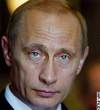& what r we giv~in the World ...fucking endless "war on???"

G-7, US and EU: All Stick and no Carrot
For example, in an ultimatum which harkens back to the prewar period of June 1914, the “so-called” G-7” (now minus Russia) has warned Moscow, unless it recognizes the results of the recent Ukrainian elections, withdraw its troops from the Russian Ukrainian border, and stops supporting separatist elements fighting in Eastern Ukraine that new sanctions will be imposed. Obama has effectively given Putin “between two to four weeks” to comply with these demands. Tough talk for sure!
With the threat of further western punitive measure against Putin’s Russia looming in the background Austria has stepped into the diplomatic fray. In a surprise announcement, the Austrian President Heinz Fischer has invited his Russian counterpart to Vienna on June 24th. The head of state is effectively extending a helpful hand or at least a handshake to his counterpart in the Kremlin, at a time when the EU and US (in a simulations and well-coordinated fashion) are seeking to minimize Russia’s resurgence as a great power to be in the 21st century.
This past week, the Austrian foreign minister Sebastian Kurz told “Die Presse” (05/07/2012) the state visit seeks to “open channels of communication”. Between whom? The EU and Russia? That’s so far remains unclear.
After Brussels, Paris all eyes are now on Vienna
Is Austria playing the role of diplomatic go-between as it has during the height of the Cuban missile crisis? Maybe so, but in any case, the post –imperial capital, going back almost two hundred years or to the “Congress of Vienna”, has always been a key or central place for sorting out international conflicts. And today’s tensions are no exception to this rule. Hence the Austrian overture to Putin.
“Whoever wants to mediate, must [be willing] to talk with both sides,” the foreign minister said. For his part, the Austrian head of state, (whose office officially announced Putin’s upcoming visit to Vienna) believes that in the midst of the current Russia vs. EU and US standoff, talking directly with the Kremlin leader is essential. “Dialogue in this present phase is of special significance,” President Fischer told the influential Austrian daily.
Are Austrian Sanction- busters ready for “business as usual”?
Whether the Russians are adored or despised by the Austrians themselves remains uncertain. Undoubtedly, both states have had historically, a tumultuous and intensive relationship with each other. In any case, the current Ukraine conflict (and the harsh sanctions regime) apparently hasn’t hurt closer bi-lateral economic, or business friendly ties at all, between the two states. Austria does lots of business in Russia. It sells machinery over there and also has according to the Austrian National bank has lent over the years, an overall sum of 36,3 billion Euros to the Russian federation in credit outlays.
In return, Russia, delivers vital oil and gas supplies to the land locked alpine country. So expect to see some big energy contracts signed during the Putin-Fisher meetings. Moreover, as part of this strange courtship, Austria has adeptly taken advantage of its much vaunted neutrality to act according to national interests, instead of abiding by EU-wide policy directives. Austria thus, has more room to maneuver diplomatically than Brussels does, when it comes to dealing with Russia. And the country is in full gear, as regards to resolving the ongoing crisis to its East.
This surely riles Germany and the US very much.
And it hasn’t forgotten the days when like Russia it was considered a “Black Sheep” within the EU or the “international community”. Back in the 1990s when a right wing party under Jorg Haider, partook in the sharing of governmental power (within a coalition government) Brussels slapped Austria on the wrist with symbolic political sanctions, which nearly relegated the country to “pariah state” status inside the EU .
Vienna felt left out or ostracised back then (or the way Moscow might feel today with respect to the west). The resentment from those days remains present in the minds of several Austrian diplomats and policy makers and politicians alike. And perhaps besides business considerations also explains why Putin now shunned on the multilateral scene, (and vilified by the western mainstream media) is hardly unpopular among influential and prominent Austrians.
No comments:
Post a Comment